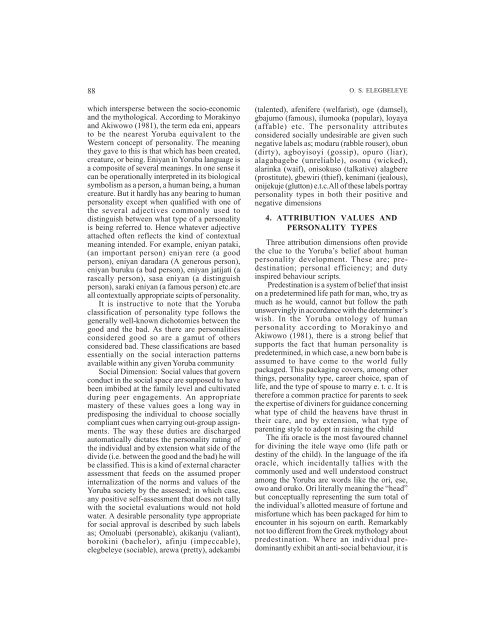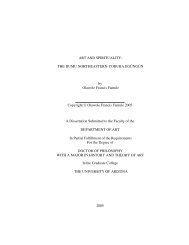The Yoruba Personality Assessment Criteria
You also want an ePaper? Increase the reach of your titles
YUMPU automatically turns print PDFs into web optimized ePapers that Google loves.
88<br />
which intersperse between the socio-economic<br />
and the mythological. According to Morakinyo<br />
and Akiwowo (1981), the term eda eni, appears<br />
to be the nearest <strong>Yoruba</strong> equivalent to the<br />
Western concept of personality. <strong>The</strong> meaning<br />
they gave to this is that which has been created,<br />
creature, or being. Eniyan in <strong>Yoruba</strong> language is<br />
a composite of several meanings. In one sense it<br />
can be operationally interpreted in its biological<br />
symbolism as a person, a human being, a human<br />
creature. But it hardly has any bearing to human<br />
personality except when qualified with one of<br />
the several adjectives commonly used to<br />
distinguish between what type of a personality<br />
is being referred to. Hence whatever adjective<br />
attached often reflects the kind of contextual<br />
meaning intended. For example, eniyan pataki,<br />
(an important person) eniyan rere (a good<br />
person), eniyan daradara (A generous person),<br />
eniyan buruku (a bad person), eniyan jatijati (a<br />
rascally person), sasa eniyan (a distinguish<br />
person), saraki eniyan (a famous person) etc.are<br />
all contextually appropriate scipts of personality.<br />
It is instructive to note that the <strong>Yoruba</strong><br />
classification of personality type follows the<br />
generally well-known dichotomies between the<br />
good and the bad. As there are personalities<br />
considered good so are a gamut of others<br />
considered bad. <strong>The</strong>se classifications are based<br />
essentially on the social interaction patterns<br />
available within any given <strong>Yoruba</strong> community<br />
Social Dimension: Social values that govern<br />
conduct in the social space are supposed to have<br />
been imbibed at the family level and cultivated<br />
during peer engagements. An appropriate<br />
mastery of these values goes a long way in<br />
predisposing the individual to choose socially<br />
compliant cues when carrying out-group assignments.<br />
<strong>The</strong> way these duties are discharged<br />
automatically dictates the personality rating of<br />
the individual and by extension what side of the<br />
divide (i.e. between the good and the bad) he will<br />
be classified. This is a kind of external character<br />
assessment that feeds on the assumed proper<br />
internalization of the norms and values of the<br />
<strong>Yoruba</strong> society by the assessed; in which case,<br />
any positive self-assessment that does not tally<br />
with the societal evaluations would not hold<br />
water. A desirable personality type appropriate<br />
for social approval is described by such labels<br />
as; Omoluabi (personable), akikanju (valiant),<br />
borokini (bachelor), afinju (impeccable),<br />
elegbeleye (sociable), arewa (pretty), adekambi<br />
O. S. ELEGBELEYE<br />
(talented), afenifere (welfarist), oge (damsel),<br />
gbajumo (famous), ilumooka (popular), loyaya<br />
(affable) etc. <strong>The</strong> personality attributes<br />
considered socially undesirable are given such<br />
negative labels as; modaru (rabble rouser), obun<br />
(dirty), agboyisoyi (gossip), opuro (liar),<br />
alagabagebe (unreliable), osonu (wicked),<br />
alarinka (waif), onisokuso (talkative) alagbere<br />
(prostitute), gbewiri (thief), kenimani (jealous),<br />
onijekuje (glutton) e.t.c.All of these labels portray<br />
personality types in both their positive and<br />
negative dimensions<br />
4. ATTRIBUTION VALUES AND<br />
PERSONALITY TYPES<br />
Three attribution dimensions often provide<br />
the clue to the <strong>Yoruba</strong>’s belief about human<br />
personality development. <strong>The</strong>se are; predestination;<br />
personal efficiency; and duty<br />
inspired behaviour scripts.<br />
Predestination is a system of belief that insist<br />
on a predetermined life path for man, who, try as<br />
much as he would, cannot but follow the path<br />
unswervingly in accordance with the determiner’s<br />
wish. In the <strong>Yoruba</strong> ontology of human<br />
personality according to Morakinyo and<br />
Akiwowo (1981), there is a strong belief that<br />
supports the fact that human personality is<br />
predetermined, in which case, a new born babe is<br />
assumed to have come to the world fully<br />
packaged. This packaging covers, among other<br />
things, personality type, career choice, span of<br />
life, and the type of spouse to marry e. t. c. It is<br />
therefore a common practice for parents to seek<br />
the expertise of diviners for guidance concerning<br />
what type of child the heavens have thrust in<br />
their care, and by extension, what type of<br />
parenting style to adopt in raising the child<br />
<strong>The</strong> ifa oracle is the most favoured channel<br />
for divining the itele waye omo (life path or<br />
destiny of the child). In the language of the ifa<br />
oracle, which incidentally tallies with the<br />
commonly used and well understood construct<br />
among the <strong>Yoruba</strong> are words like the ori, ese,<br />
owo and oruko. Ori literally meaning the “head”<br />
but conceptually representing the sum total of<br />
the individual’s allotted measure of fortune and<br />
misfortune which has been packaged for him to<br />
encounter in his sojourn on earth. Remarkably<br />
not too different from the Greek mythology about<br />
predestination. Where an individual predominantly<br />
exhibit an anti-social behaviour, it is




